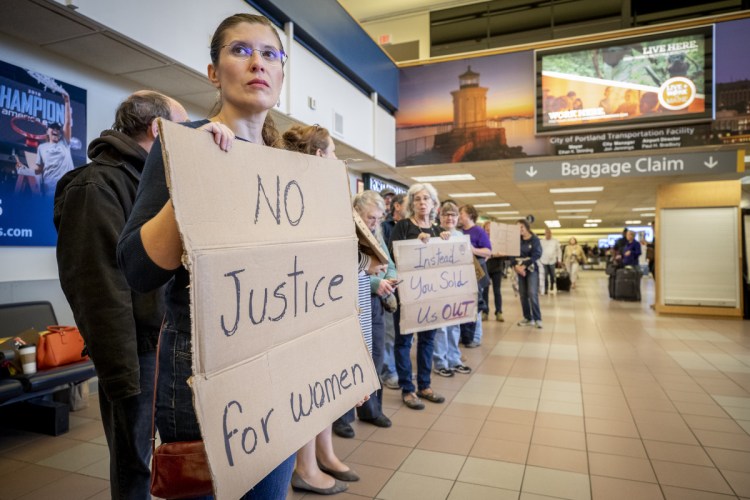U.S. Sen. Susan Collins says that while she believes that Christine Blasey Ford was sexually assaulted, she does not think that Brett Kavanaugh – sworn in Saturday as a Supreme Court justice – was her assailant.
Collins explained the reasoning behind her vote Saturday to confirm Kavanaugh on CBS’s “Face the Nation” program. In an interview recorded Saturday and aired Sunday, she said the decision to confirm for her boiled down to the presumption of innocence and the lack of any corroborating evidence to support Ford’s allegations against Kavanaugh.
“When I looked at the lack of any corroborating evidence, including no evidence from her very best friend who was present at the party, I could not conclude that Brett Kavanaugh was her assailant,” Collins said.
Asked by the show’s host, John Dickerson, why the fact that Ford told her husband and her therapist about the assault long ago did not amount to corroboration, Collins cited Ford’s failure to avail herself of the opportunity to have further interviews with bipartisan staff investigators of the Senate Judiciary Committee.
“I believe that this system has not served either Brett Kavanaugh or Christine Ford well,” Collins said.
Collins faced intense pressure as a swing vote in a brutal confirmation fight, which ended Saturday by a 50-48 vote in the Senate. Collins flew back to Maine on Saturday night.
On Sunday, Collins protesters continued to gather. About 50 people showed up at a noontime rally against Collins at the Portland International Jetport shortly before Collins spoke at a ceremony to dedicate a bridge in Norridgewock named in memory of Cpl. Eugene Cole, the Somerset County sheriff’s deputy shot and killed in the line of duty last April.
Collins told the Norridgewock crowd she was glad to be back in Maine.
“Many people have thanked me for my vote and have said that they were very pleased that I did the right thing,” she said after the event honoring Cole, The Associated Press reported.
On CBS, Collins said it was clear to her that Kavanaugh drank in high school.
“The question that was the important question was: ‘Was he a blackout drunk?’ And he said that was not the case and the testimony that we had in the interviews did not support that contention,” she said.
Dickerson also asked her about Kavanaugh’s temperament and partisanship, which one of her Republican colleagues, Sen. Lisa Murkowski of Alaska, cited in her decision to oppose Kavanaugh’s elevation to the Supreme Court.
Collins said Kavanaugh’s denial of the accusations against him in the second Senate hearing was very powerful.
“His anger and his anguish, I think, are understandable given that he’s been accused of being involved in gang rapes of women. I mean, that is a devastating allegation,” Collins said.
But she said that Kavanaugh’s questioning of senators at the hearing was over the line.
“I was glad that he apologized to Amy Klobuchar in particular,” she said.
She said that when Kavanaugh was first nominated to the federal bench in 2004, his nomination was delayed by Democrats for two years and he faced very hostile hearings.
“And yet that did not affect his performance as a judge for 12 years on the D.C. Circuit. In addition, 500 people were interviewed about his temperament and did he treat all litigants with respect, and to a person they said he did,” she said.
She said the silver lining in the whole matter is that more women will press charges now when they are sexually assaulted.
Dickerson asked Collins whether the fact that holes were poked in Ford’s allegations, even by President Trump, would in fact make it more difficult for victims of sexual assault to come forward, Collins said she does not believe that will be the case.
“I think that this has been an awakening for this country,” she said.
Beth Quimby can be contacted at 791-6363 or at:
Send questions/comments to the editors.



